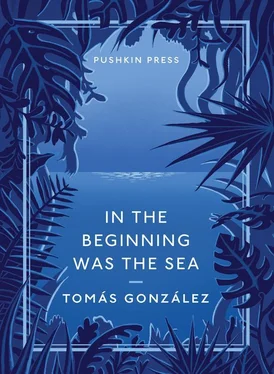The terrible blow he suffered as a result of this sordid affair was immediately followed by an irrational need to fight back, an overwhelming desire not to fail — at least in the long term. J. spent sleepless nights calculating how much money he would need to set up a shop on the finca and how much profit he might make from cattle farming. Though deeply reluctant to contemplate cutting down the majestic trees on the finca , he also initiated conversations with timber merchants who advised him there was money to be made in lumber. “At worst it would pay for the food and the aguardiente ,” J. thought, having done some rough calculations. “The sunshine and the sea don’t cost us anything.”
He negotiated a loan for two hundred thousand pesos with the bank and boarded the bus back to Turbo with a cheque for five hundred thousand pesos in his pocket — a sum he hoped would be enough to set up the shop and subsist until the business took off — and a bottle of aguardiente in his backpack. He spent the eighteen-hour journey juggling figures, drinking aguardiente and glorying in the upheaval in his life.
Elena was waiting for him on the beach when he arrived back at the finca . Seeing her there, the wind whipping her skirt against her shapely legs, J. felt touched. Solemn, bronzed by the sun, she watched the boat arrive with a calm, assured expression.
They kissed passionately.
“The stock should arrive tomorrow or the day after,” said J.
“What stock?”
“For the shop, hermana . We have to open a shop. Things in Medellín have gone to shit and we’re pretty much broke.”
“OK,” she said, “Let’s do it.”
The following day, Gilberto arrived early with timber to build the shelves and the counter.
“I’ll have it ready in a week, Don J.,” he said, immediately setting to work.
The stock did not arrive the following day, nor the day after, but a week later in two large boats, by which time the shelves had been built. Much of the order was missing. J. had paid for fifty bottles of aguardiente but only twenty arrived; there were only ten of the forty cartons of cigarettes he had ordered, and the quantities of rice and beans were short. He argued with the boatmen who insisted that this was all the warehouse manager had supplied. Elena accused them of being thieves but they ignored her. Whenever she spoke, they behaved as though she did not exist, allowing her to say her piece, then carrying on talking to J.
“I’ll go back to Turbo with you,” said J., somewhat calmer. He turned to Elena. “You start stocking the shelves, but don’t sell anything before I get back.”
The discrepancy turned out to be a misunderstanding. The warehouse manager told J. that he had written a note — which he had forgotten to give to the boatmen at the last minute — explaining that the outstanding items would be despatched with the next order since they had been having problems with their suppliers and were running low on several products.
The explanation sounded unconvincing and J., unsurprisingly, flew into a rage and threatened to have the man fired. Then, as always, he calmed down.
“I’ll tell you what we’ll do,” J. said. “You pay for my trip, you give me the missing stock now, and we’ll forget the whole thing.”
After a brief, feigned attempt to object to this idea, the man was forced to concede. Before he left, J. insisted that all future orders be shipped through Julito.
This was the first night J. slept at Julito’s house. They met by accident on the town square and when the boatman heard that J. was looking for a hotel for the night, he immediately invited him to stay.
Julito lived in one of the stilt houses J. had seen when he first arrived in Turbo looking for the harbour. It comprised three rather dark rooms with a lean-to kitchen at the back. The central living room was furnished with a small table in an alcove and there was a hammock strung from one corner to the other. As they stepped inside, Julito unhooked the hammock, pushed the table into the centre of the room and drew up two crude unpainted chairs.
“Sit down, jefe ,” he said.
Julito’s wife was fat — unsurprisingly — and surly. But this was not the same “wife” J. had met at the market. She addressed her husband in a mocking, sarcastic tone that made it clear she was no longer his dupe, that she knew how he ticked, this poor excuse for a man, that she no longer had any illusions. With J., however, she was friendly if not particularly talkative; it was clear that she was proud to have him as a guest in her home.
Julito left him sitting in a chair and went out to get some aguardiente . Meanwhile, his wife brought coffee in one of the little cups he had seen at Doña Rosa’s house. This spartan room had a certain elegance and the delicate porcelain cup shimmered in its centre like a spray of flowers. The sun began to set and deep blue shadows began to gather in the corners. J. watched through the door as the sky gradually grew darker. The sunset was peaceful and he felt happy.
Julito came back with a bottle, brought out two glasses decorated with bullfighting scenes and sat in the other chair. The two men drank late into the night. When the bottle was empty, the boatman suggested going to buy another but J. declined: he urgently wanted to get back home and needed to get up early. Julito hung up the hammock and J. stretched out and immediately fell asleep.
The following morning, after a four-and-a-half hour boat ride, he arrived back at the finca .
Elena had arranged everything on the shelves, and all that remained to be done was putting prices on them. Gilberto, who knew about local prices, helped her. They opened one ledger in which sales were to be carefully recorded and another for those who bought on credit, and the shop was ready for business.
That night Gilberto and Elena had their first serious argument. J. knew it had something to do with the counter, but never quite understood how it had started. Coming back from a walk on the beach, he found Elena in a fury while Gilberto seemed more stunned than anything else. J. knew that when Elena was in a rage, nothing and no one could calm her down; the only thing to do was wait it out until her anger, like a volcano, subsided. Taking Gilberto to one side, J. told him not to pay her any mind, that her fury would quickly pass. Gilberto shrugged and said he understood.
“All women are hot-blooded, Don J.,” he said.
After Gilberto left, J. went back to the shop.
Meanwhile, Elena pretended to study the price list.
“I will not stand for you undermining me in front of those hijos de puta ,” she said after a moment without looking up from the ledger.
ON HIS FIRST TRIP to Medellín, J. had bought a nylon fishing net measuring fifteen metres by three. It was a wide mesh net, ideal for catching tarpon and bluestripe jacks. It took five people to handle it.
The finest fisherman in the area was Salomón, one of Doña Rosa’s sons. Though taciturn and physically unremarkable, he seemed to have an extraordinary talent. During lean times, when other men came back with empty nets, Salomón would still land ten-pound sea bream.
He was always immaculately turned out. No one had ever seen him break a sweat. He wore impeccably ironed white shirts with the Red Indian logo of his Pielroja cigarettes faintly visible through the breast pocket. The pack never got wet, and even empty it was still the perfect rectangle it had been when full.
J. knew from experience that Salomón was an exceptional fisherman, having often accompanied him when he was line fishing on the beach. Every movement of his hands had a rigorous logic; some casts were tentative, allowing him to play to random chance; others were precise, perfect casts which, if executed a second earlier or later, would have failed.
Читать дальше










